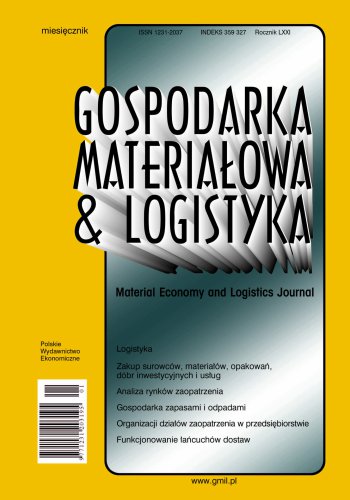The basic premises of logistification in international business
The aim of this article is to show the relationship between logistification of the world and the basic premises of this phenomenon, such as the need to recognise logistics as a new management science, a redefinition of international flow of the factors of production, or the use of information asymmetry measuring methods in international business. The theory part, featuring a review of the latest literature on the subject, emphasizes not only the need but also a necessity to develop logistics as a new branch of the management science. A special role is attributed to the impact of logistification on the interdisciplinary character of international business. Further, the article shows a pur les flux accomplishment of logistification through the flow of factors of production. Rationalisation of this process is expressed by the "flying geese formation" model, an exemplification of international flow of technical knowledge, both representational (knowing-that) and embodied (knowing-how). Finally, a new logistic model of information asymmetry (LMAI) is developed, providing a theoretical measure of the impact of logistics on reducing the effects of information asymmetry. The theoretical considerations are supplemented with an original numerical illustration of potential benefits derived by selected Polish firms from the measuring of information asymmetry levels. For this purpose the author used the results of empirical studies conducted in the period 2010–2018, from which firms representing manufacturers, distributors and service providers from nine industries were selected on a random basis. The findings of this preliminary study enabled a general estimation of the information asymmetry levels in key industries of the Polish economy.
References
Bibliografia/References
Akerlof, G. (1970). The Market for „Lemons”: Quality Uncertainty and the Market Mechanism. The Quarterly Journal of Economics, 84 (3).
Banaszyk, P., Gołembska, E. (2015). Logistyka w biznesie międzynarodowym. Warszawa: Wydawnictwa Nauko-Techniczne.
Bartels, F. L., Pass, Ch. L. (2000). International business. A competitiveness approach. Prentice Hall.
Blaik, P. (2010). Rozwój logistyki w kierunku zintegrowanej koncepcji zarządzania [w:] Logistyka w naukach o zarządzaniu, Akademia Ekonomiczna w Katowicach.
Daniels, J. D., Radebaugh, L. H. (2001), International business environments and operations, Prentice Hall.
Gattorna, J. (red.) (2003). Gower handbook of supply chain management, Mc Graw Hill.
Gąsowska, M. K. (2018). Logistyka a konkurencyjność przedsiębiorstwa. Warszawa: Difin.
Gołembska, E. (2010). Logistyka w naukach o zarządzaniu międzynarodowym. W: I. Bonk (red.), Logistyka w naukach o zarządzaniu. Katowice: Wydawnictwo Uniwersytetu Ekonomicznego w Katowicach.
Gołembska, E. (2012). Miejsce współczesnej logistyki w ekonomii i zarządzaniu. W: S. Kauf (red.), Logistyka i inne koncepcje zarządzania w naukach ekonomicznych. Opole: Uniwersytet Opolski.
Gołembska, E. (2014). Logistyka międzynarodowa. Warszawa: Wydawnictwo Naukowe PWN.
Gołembska, E. (2019). New Logistics Paradigms in Poland, MDPJ, Logistics 2019, 3(3). https://doi.org/10.3390/logistics3030019
Gołembska, E. (2020). A New Logistic Model of Market Information Asymmetry Reduction in Poland, MDPJ, Logistics 2020, 4(3). https://doi.org/10.3390/logistics5010005
Godsmark, J. Richards, J. (2020). The Logistics Outsourcing Handbook. Kogan Page.
Gruszecki, T. (2002). Współczesne teorie przedsiębiorstwa. Warszawa: Wydawnictwo Naukowe PWN.
Handfield, R., Straube, F., Pfohl, H. -C., Wieland, A. (2013). Trends and strategies and supply chain management. Berlin: BVL International.
Kubiak, J. (2013). Zjawisko asymetrii informacji a struktura kapitału przedsiębiorstw w Polsce. Poznań: Wydawnictwo Uniwersytetu Ekonomicznego w Poznaniu.
Liberska, B. (red.) (2002). Globalizacja. Mechanizmy i wyzwania. Warszawa: Polskie Wydawnictwo Ekonomiczne.
Misala, J. (2005). Wymiana międzynarodowa i gospodarka światowa. Warszawa: Oficyna Wydawnicza SGH.
Noga, A. (2011). Teorie przedsiębiorstw. Warszawa: Polskie Wydawnictwo Ekonomiczne.
Nowakowski, M. K. (red.). (2005). Biznes międzynarodowy. Od internacjonalizacji do globalizacji. Warszawa: Oficyna Wydawnicza SGH.
Rymarczyk, J. (2012). Biznes międzynarodowy. Warszawa: Polskie Wydawnictwo Ekonomiczne.
Peng, M., Meyer, K. (2019). International business. Cengage Learning EMEA.
Rouquet, A., Fabbe-Costes, N. (2019). La logistisation du monde. Presses Iniversitatnes de Provense, Aix Marseille Universite.

